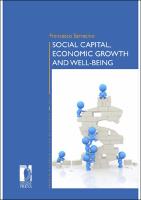Social capital, economic growth and well-being
| dc.contributor.author | Sarracino, Francesco | |
| dc.date.accessioned | 2022-05-31T10:19:28Z | |
| dc.date.available | 2022-05-31T10:19:28Z | |
| dc.date.issued | 2012 | |
| dc.identifier | ONIX_20220531_9788866552772_302 | |
| dc.identifier | OCN: 1226018087 | |
| dc.identifier.issn | 2705-0297 | |
| dc.identifier.uri | https://library.oapen.org/handle/20.500.12657/55018 | |
| dc.description.abstract | In the long run economic growth does not improve people's well-being. Traditional theories – adaptation and social comparisons – explain this evidence, but they don't explain what shapes the trend of subjective well-being and its differences across countries. Recent research identified in social capital a plausible candidate to explain the trends of well-being. This dissertation adopts various econometric techniques to explore the relationship over time among social capital, economic growth and subjective well-being. The main conclusion is that social capital is a good predictor of the trend of subjective well-being, both within and across countries. Hence, policies for well-being should aim at preserving and enhancing social capital for the quality of the social environment matters. | |
| dc.language | English | |
| dc.relation.ispartofseries | Premio Ricerca «Città di Firenze» | |
| dc.title | Social capital, economic growth and well-being | |
| dc.type | book | |
| oapen.identifier.doi | 10.36253/978-88-6655-277-2 | |
| oapen.relation.isPublishedBy | bf65d21a-78e5-4ba2-983a-dbfa90962870 | |
| oapen.relation.isbn | 9788866552772 | |
| oapen.relation.isbn | 9788892735750 | |
| oapen.series.number | 4 | |
| oapen.pages | 166 | |
| oapen.place.publication | Firenze |

